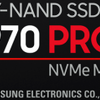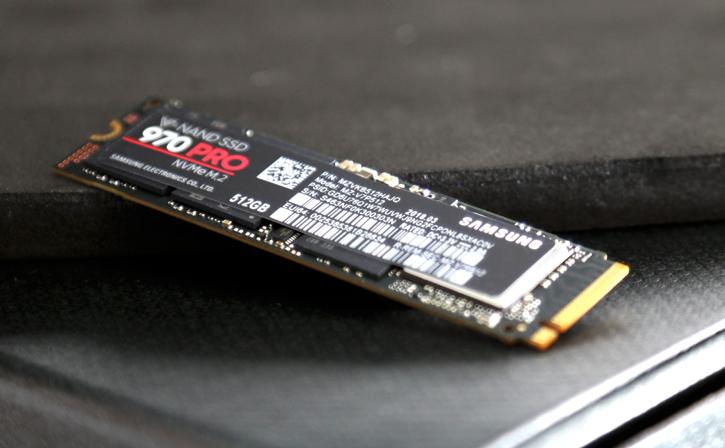Final Words & Conclusion
Final Words & Conclusion
We feel the EVO and PRO are both at a grand level and very close to each other in performance, the 970 Pro model definitely has a bit more bite in some areas though. Realistically, the 970 series is more of an evolution rather than a revolution, it has been all about refining the technology. The new 64-layer NAND helps in cutting down costs, the Phoenix controller gives that little extra edge in perf and the nickel plating on top of the controller helps it bypass thermal throttling better. That last one sounds great, but the reality is that the controller still runs very warm, we recommend that you use a heatsink for M2 units, which comes with most high-end and enthusiast 2018 motherboards. In relative performance numbers whether you choose an EVO or PRO honestly you'll not notice the difference. This obviously is the big conundrum with the fastest NVMe based storage units anyway. I'll state this again though, with a regular proper SATA3 SSD you're already there for 98% of your (consumer) workloads as your bottleneck actually is your OS and the way it manages file IO. Objectively speaking measuring between a properly fast SATA3 and this 970 EVO/PRO things would remain relative under normal workloads. And therein the answer is to be found, the guys who will benefit the most from products like the 970 series are the one with massive workloads. The professional users with virtualized systems, or the ones that write transcoded or encoded video and media files all the time. The avid PC aficionado or PC gamer likely not notice any difference. But within confined and complicated workloads, NVMe products will shine. Would you ever notice any real-world difference in-between a 950, 960 series product or a 970 Pro or Evo? We also doubt that very much. The difference over a SATA3 SSD, however, is certainly noticeable and most definitely measurable, but again is something relative to experience as a regular SSD already does workloads in split-second timings. Much like we concluded in the 960 reviews, for the 970 Evo and Pro it's all the same. However, with one exception, the PRO model offered has properly increased endurance numbers, depending on the model (volume size) 600 TB written is guaranteed for the tested 512GB model and combined with a 5-year warranty that certainly is impressive. If the controller or the NAND doesn't die, it would last you a decade two depending on your workload, easily.
Performance
Any modern age SSD is enjoyable, very much so. If you put a drive like this into your compatible PC, you'll have no idea what is about to hit you. We very much enjoy the grand sustained performance of this SSD series; if you copy a vast amount of compressed data, then the SSD will perform seriously fast in performance. Make no mistake, replacing an HDD with an SSD in your PC eliminates the random access lag of the HDD head, as it is no longer mechanical. That combined with the performance SATA3 / M.2 offers these days is simply a massive difference and probably the best upgrade you can make for your computer anno 2018.
The new storage units are very fast and strong, on all levels really, queued 4K IOPS performance is staggering. This SSD writes and reads serious amounts of tiny files in a very fast fashion. We stated it before though, IOPS is not something you as a consumer should worry about too much unless you are doing a lot of database related work or create complex workloads on your PC, but this SSD certainly ranks high within this aspect. Trace testing - we feel that one of the best tests in our entire benchmark suite is PCMark 64-bit. Trace tests can emulate what you guys do on your PC but then multiplied by a factor of 100, this test puts more focus on read performance opposed to writing though. The outcome of the results with the SSD is exceptionally good. Sustained read / write performance, again excellent as advertised. Read performance in particular leads and is top ranking. Overall the series is impressive. Zoom in at both IOPS and trace performance and you'll notice that the SSD can manage serious workloads without breaking so much as a drop of sweat. So whether you write lots of small files, copy big MKV movies or do it all together.
Pricing & Warranty
Samsung NVMe Pro series prices historically have not been cheap, but obviously a unit this fast is more expensive opposed to a regular SATA3 SSD. For the 512GB volume, sizes expect prices in the 55~60 cents (Euro/USD) per GB range at 269 USD/Euro, but that might vary a bit based on region and demand. The higher volume sizes should be a notch cheaper relatively, of course. Remember though that this type of NVMe SSD, needs a compatible motherboard (x4 PCIe Lanes Gen 3.0). Samsung tops off this SSD with a 5-year warranty period or your TBW value (whichever one comes first). Depending on volume size even 1200 Terabytes written (TBW) for the 1 TB capacity, half that for the 512 GB version and again half of that (150TB) for the 256 GB model. We had hoped to see the 5-year warranty increased towards 7-years though, as the gap to the EVO simply is small now.
Concluding
For your normal consumer, performance wise you're not going to notice any difference in between an EVO or PRO unless you precisely measure it in a synthetic manner. The main difference is the way the NAND cells are written, three bits per cell for the EVO, and two bits per cell for the Pro models. So what it the gain then? Well, a perf increase at incredibly high and complicated workloads. Also, writing 2 bits per cell places less strain on that NAND cell for the number of times it can be written, and that increases lifespan. If you purchase a Pro model, you do that solely for the reason of Endurance, which is the number of terabytes written before the NAND cells die off. I've mentioned it a couple of times in my reviews already, and will keep doing so; the MLC (Pro) versus TLC (Evo) discussion as far as I am concerned can be put to rest, SSDs with TLC NAND has proven to be extremely long-lasting and reliable thanks to the latest technologies. Samsung will give you a 5-year warranty on both the 970 product series (that or the TBW value whichever one comes first) and that in technology land is a nice warranty to have, 5 years always is preferred. Remember, even with the slowest SATA3 SSD, you can find, the access times will make a tremendous difference as you do not have a mechanical magnetic head seeking data on platters. HDDs, however, are still relevant, for big storage and perhaps games. But for your OS a proper fast SATA3 SSD in the 400~500 MB/sec range already is really good. Some, however, want that platinum experience, going from a fast SATA3 SSD towards NVMe M2 again is a much faster step, but less noticeable compared to that regular SATA3 SSD, as you already have the fast access times and split-second application loading. You'll benefit from NVMe SSD storage units if you have the workloads for it, writing continuously, video editing and so on. For just gaming and OS functionality, however, the differences are in a very thin margin to be able to measure, as your PC file-IO is becoming the bottleneck. So how fast do SSDs really need to be? Storage technology not evolving would mean us still be in the stone-age technology wise. The coming years will be all about lower prices and increased capacity and endurance. That said and done, the 970 Pro is impressive, but so is the EVO, which makes more sense value for money wise - it is as plain and simple as that. With an M2 SSD of this class, please check with your motherboard manufacturers if the board can support M.2 with four PCI-Express lanes (Gen 3.0) and NVMe. Whatever you are planning to do with this storage unit, you are good to go from gaming, overall net pc usage (albeit overkill) to video transcoding, virtualized workloads, editing and content creation, this is by far among the fastest SSD series available for I/O intensive workloads, consumer grade that is. If you are hunting down an M2 unit with a nice black PCB and very proper performance metrics, hey this might be it for you. At the moment of writing the 512GB Pro model sells at roughly 289 Eur, with the 1TB version listed at 549 Euro, that is just very expensive TBH. The 970 Pro series come highly recommended a top pick, lower prices would be needed though as I find it hard to recommend the Pro over the Evo series, but sure, these are the Samsung flagship NVME SSDs and we know they'll sell like cute little puppies regardlessly.
Recommended Downloads



